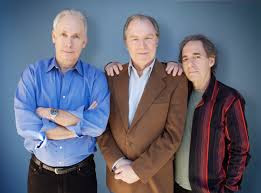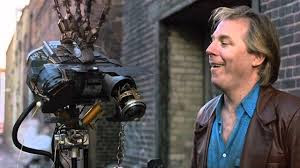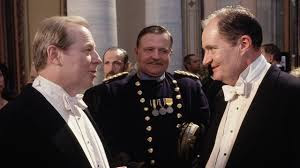Editor's Note: This is the fifth and concluding part of a transcript of an afternoon spent by Melbourne's then Sunday Age film critic Tom Ryan and a trio of American funsters Christopher Guest, Harry Shearer and Michael McKean who were in town to promote their latest movie A Mighty Wind way back in 2003. If you wish to read Part One CLICK HERE For Part Two CLICK HERE. For Part Three CLICK HERE. For Part Four CLICK HERE
**************************
 |
| Christopher Guest, Michael McKean, Harry Shearer |
What about the rest of you. Do you read your crits? Are you interested in that kind of public response?
MMcK: No. I tell you…
HS: Well, public response is different. I get e-mails from the public all the time and I read those, but I stopped reading entertainment news a while back – the trade and the entertainment news in Los Angeles – basically because I realised after way too long thinking about my own reactions that it’s all part of an envy machine. You read the stuff and you go, ‘Oh, he’s doing that. Oh, shit.’ Or ‘He’s doing that. Oh goddamn it.’
HS: I said this on the panel the other night to this actor who was on there. There was this press note that said that she reads all her reviews. Above and beyond everything else – I know, because it’s about me and I think about a lot of other people in the business – people can say nice stuff about you or praise you and it goes in one ear and out the other. But I think if they say something nasty about you, there’s this part of your brain that plays it over and over again. It tortures you.
CG: Yeah. Actors are people too, but they’re hypersensitive, obviously, to ‘Why are we standing up there and performing?’ But I think it’s harmful. I really do.
MMcK: I don’t read the reviews either. But Annette reads Vanity Fair.
HS: Oh, no. Now that’s going to be the title of Tom's article. ‘Annette O’Toole Reads Vanity Fair’. Shock! Horror!

Michael McKean, Annette O'Toole
But isn’t there a chance that you could actually learn something from a critic, get some insight?
HS: To what? The movie’s done.
MMcK: You can get some insight into the critic’s taste.
CG: I mean, look, I do what I do. I do what I do. There are a lot of smart people out there. There are some very good writers. It just seems to me… I don’t want to pick and choose. That spoils the whole thing…
HS: And the idea that somebody like Chris lives in the hermetic universe where he’s only surrounded by ‘yes’ men and so critics are the only reality that penetrate this universe is just so wrong. Bob Leighton, his editor, whom he works with on a continuing basis for eight months during the editing of these movies, is a wonderfully perceptive and smart guy.
CG: And I’m the biggest ‘no’ man. I think we’re all extremely critical about what we do and serious about what we do. I’m not surrounded with a… You know, we go on this trip and, because it’s a foreign country, they bring in people to guide us. But I go on trips in the States and I go by myself and people are shocked. ‘Where’s the posse?’
Some people travel with protectors. With me, it’s just me. I call people personally. And they’re shocked. Journalists are shocked. And I say, ‘Oh! Who were you expecting? That I would have my assistant call and then...’ I don’t live in that world…. That’s my choice. It doesn’t work for everybody, but it’s what I do.
Michael, what do you think about this?
MMcK: You know, I guess I agree in theory. But, you know, I find myself reading stuff. I think what I have learned over the last 30 years or so is that none of it matters. If the good doesn’t matter, then the bad doesn’t matter either, in the long run. Because the next thing I do, I’m still working by the seat of my own pants and not according to anybody else’s idea of what my pants are made of, to extend the metaphor.
It really doesn’t matter what anyone says about you because on the day you still have to do the same job. And you’re not using any insights that you gained from your last reviews.
HS: You can’t use… Even the best critic, he’s not there to tell you how to do the next thing. So you’re still back down to your own instincts.
MMcK: I was in a movie called Short Circuit 2 [1988] and I will never forget the scene with the robot….
 |
| Robot, Michael McKean, Short Circuit 2 |
HS: I swear to God I thought he was human.
MMcK [laughing]: You know, for the movie I spent three months of my life in Toronto and I had some fun and became friends with some people up there, and with a robot…
HS: Hahaha
MMcK: Friends! And I did have a nice time and the movie came out and it was OK – the sequel to a movie that I didn’t even see – and I didn’t know how successful it was…
HS: You should read the reviews of the first one.
MMcK: Hahaha.
HS: Pretty damn good.
MMcK: But I was in Hartford, Connecticut, or I was in New London, Connecticut, and I read a really bad review in The Hartford Courant. Or maybe it was The New London Day. And it said, ‘Michael McKean, whose career has been more lost than found since Laverne and Shirley...’
HS: Oh!
MMcK: And I’m reading this thing and I’m going, ‘Well, chances are, the guy who works for The New London Day wants to work for The Hartford Courant, but he really will never have any insight into my life one way or another.’ But by reading this, I’ve made him have some kind of impact…
HS: It’s giving these people power.
MMcK: That was an interesting lesson for me. That was sort of like, ‘I’m feeling bad right now,’ but that was his only impact.
HS: The question boils down to: whom do you want to give power over your life to?
MMcK: Yeah.
Over your lifetime, have you seen a change in the way the media has covered the kind of things that you do?
MMcK: I dunno.
CG: Well, the last time I read a review was 1988.
Really?
CG: Yeah.
HS: I can’t see any trend.
CG: So I’m not the best one to comment on that. What I do see from being interviewed is the idea that we were interviewed for Best in Show, and we did, in one day, 70 television interviews, and a third of them were from Internet people.
I had no idea who they were but they walked in out of nowhere, and had no idea of what they were talking about, but because they were on the Internet they were given some kind of credential. I don’t know what they do, because I’ve never seen it or heard it. This isn’t someone apprenticing or working for a paper and becoming a drama critic. This is, ‘I’m gonna now just show up and interview you.’ And they don’t know what to ask and they don’t know anything. No reference points to the business or anything. Just complete stupidity. That is bad.
My sense is that the media has changed, that it’s gone from being observational to having always to be sensational in the way stuff gets published.
CG: Yeah?
And as a result people like you suffer…
HS: Well, the artist always suffers. That’s the thing. This is the commonality in my response to all your questions because, whether it’s in regard to the mainstream of the business or to the critics or to the media in general, your job is to maintain contact with the part of you inside that got you into this in the first place, that made you think, ‘I can be funny. Here’s what I think is funny. This is my plan for what’s funny.’
And all these other things are trying to push you off that course. They’re trying to push you either to some consensus place or to some other place, some fashion place… All that is not helpful. The only helpful thing is to try to be better at what you, do to get your chops better, to learn more about your craft. None of this helps you to do that.
MMcK: And I think most journalists are taking their responses and their opinions and transmitting them to people who know even less than they do.
HS [to me]: Don’t take this personally. This isn’t about you.
MMcK: No, no, no, no. But at its very lowest, it’s that kind of Entertainment Tonight thing, watching what you’re doing. You know, ‘Billy Bob and Angelina are getting back together again.’
HS: And who really gives a fuck?
MMcK: And if that’s the end result, then who cares? It has nothing to do with anything either of them do. I think to varying degrees, they’re both talented people…
HS: Oh, but he ruined her life.
MMcK: You’ve had a ‘Billy Bob’ tattooed on your ass? Come on.
HS: Well, it didn’t do much for me.
CG: Ah. That huge white thing on your lip.
What about when something like The Simpsons finishes up on a university course?
HS: Yeah! Oh, that’s alright. But it would make George’s parents mad, I would think. ‘I’m paying that for you to study The Simpsons?’ George is just like my godson.
I guess it’s his revenge. But there must be something about the response that (a) takes it seriously or that (b) is totally obsessed with it, that you have to find really satisfying.
HS: Well, look. I can clearly remember the stuff that I was obsessed with as a kid. I could not go to sleep without hearing Bob and Ray who were this wonderful American comedy team [Bob Elliott (1923–2016) and Ray Goulding (1922–1990)]. So because of that I have some respect for people like that. They’ll grow out of it. We all grow out of it.
MMcK: Would you like to hear some Tom Lehrer songs now?
HS: So, you know, it’s fine. I’m glad they like it. I’m glad they watch it. I wish they were getting a share of the profit.
MMcK: What about this guy who’s doing MacHomer?
HS: I know. That’s been dealt with. Not to our satisfaction, but to Fox’s.
Somebody’s doing MacHomer?
MMcK: Yeah. MacBeth with Simpsons characters.
Well, there was MacDuff, wasn’t there? Not MacDuff…
MMcK: MacBird.
HS: But there was also a Dutch beer in this country that they shut down. I think people’s early reactions to stuff… I have a very strong memory of when Michael and I were first doing the comedy group together and people would come up to us and say, ‘You two guys remind us of …,' and they named another group for whom we had nothing but contempt. You two groups are my favourite comedy groups.’
And I kinda had to think about that and realise that, hey, this is what they do for a living and these people are perfectly entitled to like us and something that we don’t like. And that’s OK. They have that right. And I don’t have the right to really judge them for that because all they’re in search of is a laugh and some entertainment.
MMcK: And they happen to be right in that case.
HS: Well, they happen to be right.
MMcK: I remember somebody saying this. ‘I love British humour. Monty Python, Benny Hill.’
HS: Hahaha. That’s a big jump! Wasn’t just a comma there. More like a chasm.
MMcK: But they like to laugh and they both work for them.
CG: Someone I knew quite well said to me, ‘I love that scene in Mighty Wind where Baliban slaps Michael Hitchcock on the head. It reminded me of my favourite Adams Family moment.’
HS: Hahaha. Exactly!
CG: So what’re you gonna do? What am I supposed to say? ‘It’s not allowed.’ You can’t tell people that. That’s what they like.
HS: Because it’s not their job. They’re not supposed to be making the kind of distinctions that we are in the same way that, you know, somebody who plays violin all their lives in a classical orchestra is gonna be much more critical of other performers than I’m going to be. And I’m entitled to like what I like without being subjected to their withering scorn.
 |
| Michael McKean, Pedro Armendariz, Jr. and Jim Broadbent And Starring Pancho Villa as Himself |
MMcK: I met a wonderful guy, an actor, who’s in this Pancho Villa movie I just did… [Bruce Beresford’s And Starring Pancho Villa as Himself (2002)]
HS: That piece o’ shit! Oh, sorry.
MMcK: He’s a wonderful violin player as well. He’s actually a violin player. He’s never been an actor before, but he plays this mood music guy. And I said, ‘Who do you think are the great violin geniuses?’
CG: ‘Besides me?’
MMcK: He said, ‘Itzhak Perlman and Stephane Grappelli.’ There’s no argument. This is a guy who knows the instrument and adores these two very, very different types of artists. And there was no conflict at all. You like what you like.

No comments:
Post a Comment
Note: only a member of this blog may post a comment.